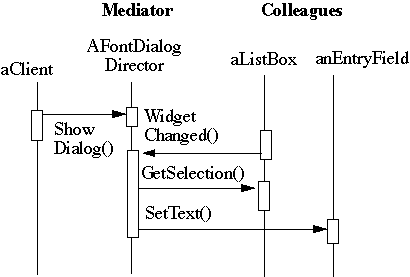 CS 696: Advanced OOP
CS 696: Advanced OOPDoc 19, Memento & Mediator
 CS 696: Advanced OOP
CS 696: Advanced OOP
| Memento | slide # 1 |
| ...Motivation | slide # 1 |
| ...Consequences/ Implementation | slide # 4 |
| Mediator | slide # 5 |
| ...When to use the Mediator Pattern | slide # 5 |
| ...Issues | slide # 6 |
class Memento
{
private Hashtable savedState = new Hashtable();
Memento() {}; //Give some protection
void setState( String stateName, Object stateValue )
{ savedState.put( stateName, stateValue );}
Object getState( String stateName)
{
return savedState.get( stateName);
}
Object getState( String stateName, Object defaultValue )
{
if ( savedState.containsKey( stateName ) )
return savedState.get( stateName);
else
return defaultValue;
}
}
class ComplexObject
{
private String name;
private int someData;
private Vector objectAsState = new Vector();
public Memento createMemento()
{
Memento currentState = new Memento();
currentState.setState( "name", name );
currentState.setState( "someData", new Integer(someData) );
currentState.setState( "objectAsState", objectAsState.clone() );
return currentState;
}
public void restoreState( Memento oldState)
{
name = (String) oldState.getState( "name", name );
objectAsState = (Vector) oldState.getState( "objectAsState" );
Integer data = (Integer) oldState.getState( "someData");
someData = data.intValue();
}
// Show a way to do incremental saves
public Memento setName( String aName )
{
Memento deltaState = saveAState( "name", name);
name = aName;
return deltaState;
}
public void setSomeData( int value )
{
someData = value;
}
private Memento saveAState( String stateName, Object stateValue )
{
Memento currentState = new Memento();
currentState.setState( stateName, stateValue );
return currentState;
}
}
Let originator have access to all set/get/state of Memento
Others let hold Memento's and destroy
C++ has good support for Memento

When reusing an object is difficult because it refers to and communicates with many other objects
When a behavior that's distributed between several classes
should be customizable without a lot of subclassing
class DialogDirector
{
private Button ok;
private Button cancel;
private ListBox courses;
public void ListBoxItemSelected()
{ blah}
public void ListBoxScrolled()
{ blah }
etc.
}
class DialogDirector
{
private Button ok;
private Button cancel;
private ListBox courses;
public void widgetChanged( Object changedWidget)
{
if ( changedWidget == ok ) blah
else if ( changedWidget == cancel ) more blah
else if ( changedWidget == courses ) even more blah
}
}
3) Generic change method overloaded
class DialogDirector
{
private Button ok;
private Button cancel;
private ListBox courses;
public void widgetChanged( Button changedWidget)
{
if ( changedWidget == ok )
blah
else if ( changedWidget == cancel )
more blah
}
public void widgetChanged( ListBox changedWidget)
{
now find out how it changed and
respond properly
}
}
